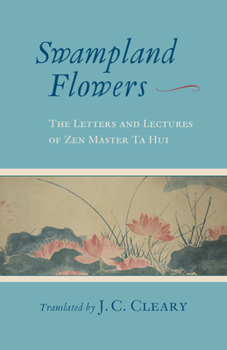Swampland Flowers: The Letters and Lectures of Zen Master Ta Hui
The writings of the twelfth-century Chinese Zen master Ta Hui are as immediately accessible as those of any contemporary teacher, and this book, which introduced them to the English-speaking world in the 1970s, has become a modern classic--a regular feature of recommended reading lists for Zen centers across America, even though the book has become difficult to find. We are happy to make the book available again after more than a decade of scarcity...
Format:Paperback
Language:English
ISBN:1645470830
ISBN13:9781645470830
Release Date:April 2021
Publisher:Shambhala
Length:160 Pages
Weight:0.79 lbs.
Dimensions:0.4" x 5.5" x 8.5"
Customer Reviews
3 ratings
Zen Practice in the Midst of Family-life and Work-life
Published by Thriftbooks.com User , 16 years ago
"Swampland Flowers" is a selection of letters written more than 850 years ago by Ta Hui. He was a leading Chinese Zen or Chan master, 12th in the Rinzai or Lin Chi lineage. His letters are no-nonsense, personal, helpful. They almost constitute a correspondence school in Zen practice for non-monks, practicing in the midst of family- and work-life. It is as if his letters were written to you and me and just arrived in the mailbox. Always fresh: a letter that roused little interest last year may be right on point for my practice this year. Translator J. C. Cleary has arranged the letters in a subtle but meaningful way and has translated them in a consistent style. He leaves me feeling that I know the grand old man who wrote them. "Swampland Flowers" is one of my recurrent favorites among all Zen books. Another of those favorites? "The Mirror of Zen" by Korean Zen Master So Sahn. ALthough separated by linages, by translators, by hundreds of years, and thousands of miles ... these two old masters almost speak with one mouth.
Excellent for study!
Published by Thriftbooks.com User , 17 years ago
This was one of several books used for a college course took on Buddhism. Ta Hui was a major Chinese Buddhist figure, and his writings are profound. This would be good for groups discussion or independent study.
Lotus Buds in Muddy Waters
Published by Thriftbooks.com User , 18 years ago
This is an important translation in many ways. First of all, Ta Hui is a key figure in the Rinzai lineage of Zen* and has been very influential in the shaping of this form of Buddhism as it comes down to us today. On this merit alone, any translation of his works and words is necessary and welcome, as we try to assess that influence as well as get in touch with the wise words of a very religious and spiritual man in Sung Dynasty China, words that do indeed speak with a jarringly colloquial eloquence across the oceans and centuries. So the historical importance and universal appeal are both there. Furthermore, as far as eloquence goes, this text has more of it than most; sometimes reading Zen texts is like gnawing on an iron bar, but since almost all of this book is made up of letters and addresses to laymen, Ta Hui gets his hands dirty and his feet wet "dragging through mud and water" with grandmotherly solicitude, breaking down Zen rhetoric into manageable portions. Oh, the good ol' paradoxes, seeming non-sequiters, and nondualistic loopdeeloops are still there, but toned down and elaborated in ways Ta Hui wouldn't have bothered with had he been addressing his monastic peers, and he's careful in several points to ward off "anything goes" misunderstandings of Zen practice (evidently a problem then as now). That being the case, this makes for an excellent and accessible introduction into Zen discourse, thought, and practice, and I would highly recommend its use as a primary text in the university classroom. And since it is addressed to laymen, people trying to meditate and be Buddhists while out in the secular world engaged in the daily grind, it's very relevant to most American practitioners of Zen today who are usually in much the same situation. So this book very much has appeal and usefulness both at the scholar's desk and on the meditation cushion. Cleary's translation style is quite appropriate, too, remaining true and accurate to Ta Hui's language while not being afraid to get slangy when he does. The flow of words is unstrained and natural while not fast and loose. The footnotes and parenthetical remarks are handled with good balance, making references obscure to the 20th century American reader clear while not talking over the author himself. The only thing really lacking as far as I was concerned was a brief biographical sketch of the laymen to whom these letters are addressed, perhaps as a little appendix in the back. Who is Ta Hui talking to? Why does he keep writing to Li Hsien-ch'en and Tseng T'ien-yu multiple times while only writing letters to others once or maybe twice? Or is this only an effect of Cleary's selection process? All of this would have been good to know, but the lack thereof doesn't detract that much from the book, which still stands quite well on its many merits. I highly recommend this book to any and all. *(I approach from the Japanese side, but "Lin Chi lineage" and "Ch'an" if you prefer. But then why don't I re





